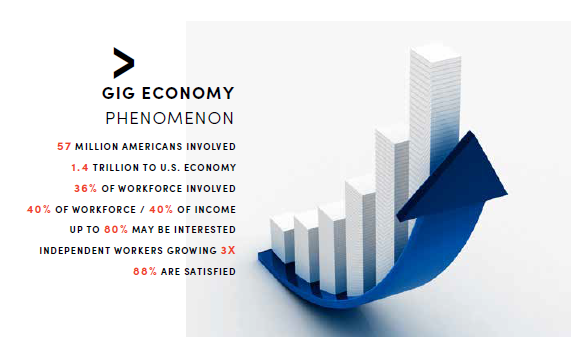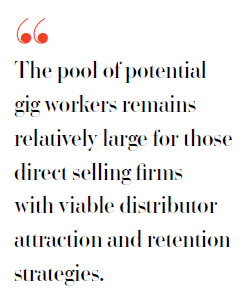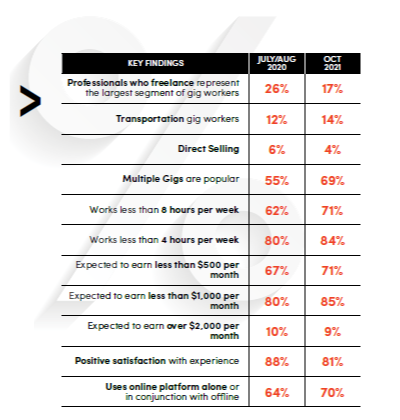New opportunities for direct selling
That the gig economy is growing at an ever-increasing rate is an irrefutable fact. With more than 57 million Americans involved and $1.4 trillion+ changing hands annually, the gig economy reflects people’s desires for more flexible work opportunities and greater freedom as to how, when and where work is performed. For the past few years, we have been observing the gig economy and its workers in considerable detail, focusing on exploring the nuances that exist in gig economy work and the similarities and differences among gig workers. Our most recent research has uncovered broad trends that may portend the future of the gig economy; these trends have specific implications for direct selling. We discuss here four of the trends we discovered through extensive, nationwide survey research conducted in July 2020 and October 2021.


- We found a tendency for more individuals to pursue multiple gigs in 2021 than in 2020. More specifically, people entering the gig economy over the past year were more interested in pursuing multiple gigs than simply working a single gig. Research findings relating to this trend have special relevance for direct selling. Since our prior research has determined that a direct selling gig often tends to be a secondary gig, rather than a primary gig, the multiple gig trend would seem to bode well for direct selling and provide revenue growth and recruiting opportunities. This seems especially true because the increase in multiple gigs is correlated with less time being spent on a primary gig. It is possible to speculate that only working one gig is becoming less popular because many gigs are complementary to other gigs. Since gigs often involve underutilized time, hard assets, knowledge and skills, the trend toward working multiple gigs may also indicate a desire to leverage such assets as effectively as possible. Moreover, working multiple gigs could be a leading indicator that a gig worker is taking steps toward becoming more micro-entrepreneurial.
- We also found that gigs are more likely to be carried out through online platforms in 2021 than in 2020. This movement, due to both technology advances and the increasing adoption of online platforms by a variety of companies—both large and small—also would seem to bode well for direct selling whose distributors work from home. Online-related gigs would appear to have the potential to increase the effectiveness and efficiency of the direct selling process if direct selling companies can “stay ahead” of the technology curve and provide their distributors with appropriate technology tools and support. For example, party plan selling is enhanced when powerful digital support is utilized to enable a virtual party setting wherein products can be shared and enthusiasm communicated. There are no physical constraints nor limitations of geography or time zone with virtual parties.
- Another trend we observed is that the number of individuals calling themselves direct selling distributors declined slightly. Overall, the number of individuals who pursue a direct selling opportunity is a relatively small percentage of “eligible” gig workers—about 5 percent of those gig workers with more than one gig. This suggests the pool of potential gig workers remains relatively large for those direct selling firms with viable distributor attraction and retention strategies. Most direct sellers benefit from personally influenced customers who continue to interact with and purchase from them over a period of time. Such relationships contribute to attracting a greater share of gig workers to direct selling.
- The final trend we discovered is a continuation of realistic earnings expectations among gig workers. Whereas our prior research found that about two-thirds of the people entering the gig economy expected to earn less than $500 per month from a gig (and actually did so), our current research indicates that this income expectation has actually increased a bit. About 71 percent of the gig workers surveyed in October 2021 have that same expectation. Likewise, the primary motivations that gig workers report for working their gigs have not changed over the past year. More than 80 percent of the gig workers surveyed in 2020 and 2021 stated that paying bills, saing and investing more and improving personal lifestyles motivated their gig work. These characteristics seem to line up with the expectations and motivations of a majority of direct selling distributors and reinforce an opportunity for direct selling growth if properly communicated.

In summary, the gig economy and its associated gig workers are here to stay and represent opportunities for forward-thinking direct selling companies. The many choices support the needs and desires of all segments in society—from Generation Z to Millennials to Gen X to Baby Boomers—who seek an opportunity to embrace alternative ways to work and use their entrepreneurial skills.
While there are future challenges for direct selling, there have always been challenges, especially during times of innovation and change. The future of work will be different in all formats. Debates and discussions will continue regarding how gig workers should be classified. “Less is more” has become a strategic imperative as a consequence of the pandemic, and businesses are learning to do more with less with technology being the great enabler. While new workers want more, perhaps they want to do less. They no longer tolerate complexity. When they find complexity, they seek simplicity. Direct selling, with its micro-entrepreneurial business model, is a channel of distribution that enables long-term relationships between intermediaries and customers that should benefit from the trends we have observed.

John T. Fleming is author of Ultimate Gig: Flexibility, Freedom & Rewards published by Emerald Publishing (utlimategigresources.com – Amazon, Barnes & Nobel) which provides an in-depth glimpse of the future of work and how the gig economy has fueled the growth and appeal of flexible work opportunities. John is principal of Ideas and Design Group, LL, and recipient of both the DSA Hall of Fame and DSEF Circle of Honor recognitions.

Robert A. Peterson, Ph.D., is a professor and holds the Stuart Chair in Business Administration at The University of Texas at Austin. He has been observing and researching direct selling for more than 30 years. In 1991 he received the Circle of Honor Award from the Direct Selling Education Foundation.
From the December 2021 issue of Direct Selling News magazine.


